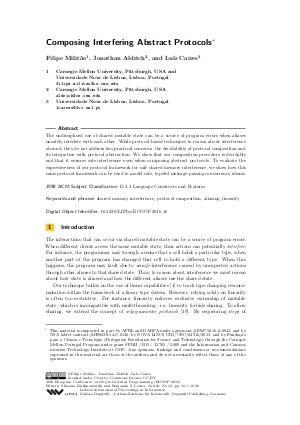Composing Interfering Abstract Protocols
Authors Filipe Militão, Jonathan Aldrich, Luís Caires
-
Part of:
Volume:
30th European Conference on Object-Oriented Programming (ECOOP 2016)
Part of: Series: Leibniz International Proceedings in Informatics (LIPIcs)
Part of: Conference: European Conference on Object-Oriented Programming (ECOOP) - License:
 Creative Commons Attribution 3.0 Unported license
Creative Commons Attribution 3.0 Unported license
- Publication Date: 2016-07-18
File

PDF
LIPIcs.ECOOP.2016.16.pdf
- Filesize: 0.75 MB
- 26 pages
Document Identifiers
Subject Classification
Keywords
- shared memory interference
- protocol composition
- aliasing
- linearity
Metrics
- Access Statistics
-
Total Accesses (updated on a weekly basis)
0Document
0Metadata
Abstract
The undisciplined use of shared mutable state can be a source of program errors when aliases unsafely interfere with each other. While protocol-based techniques to reason about interference abound, they do not address two practical concerns: the decidability of protocol composition and its integration with protocol abstraction. We show that our composition procedure is decidable and that it ensures safe interference even when composing abstract protocols. To evaluate the expressiveness of our protocol framework for safe shared memory interference, we show how this same protocol framework can be used to model safe, typeful message-passing concurrency idioms.
Cite As Get BibTex
Filipe Militão, Jonathan Aldrich, and Luís Caires. Composing Interfering Abstract Protocols. In 30th European Conference on Object-Oriented Programming (ECOOP 2016). Leibniz International Proceedings in Informatics (LIPIcs), Volume 56, pp. 16:1-16:26, Schloss Dagstuhl – Leibniz-Zentrum für Informatik (2016)
https://doi.org/10.4230/LIPIcs.ECOOP.2016.16
BibTex
@InProceedings{militao_et_al:LIPIcs.ECOOP.2016.16,
author = {Milit\~{a}o, Filipe and Aldrich, Jonathan and Caires, Lu{\'\i}s},
title = {{Composing Interfering Abstract Protocols}},
booktitle = {30th European Conference on Object-Oriented Programming (ECOOP 2016)},
pages = {16:1--16:26},
series = {Leibniz International Proceedings in Informatics (LIPIcs)},
ISBN = {978-3-95977-014-9},
ISSN = {1868-8969},
year = {2016},
volume = {56},
editor = {Krishnamurthi, Shriram and Lerner, Benjamin S.},
publisher = {Schloss Dagstuhl -- Leibniz-Zentrum f{\"u}r Informatik},
address = {Dagstuhl, Germany},
URL = {https://drops.dagstuhl.de/entities/document/10.4230/LIPIcs.ECOOP.2016.16},
URN = {urn:nbn:de:0030-drops-61108},
doi = {10.4230/LIPIcs.ECOOP.2016.16},
annote = {Keywords: shared memory interference, protocol composition, aliasing, linearity}
}
Author Details
References
-
A. Ahmed, M. Fluet, and G. Morrisett. L3: A linear language with locations. Fundam. Inf., 77(4):397-449, December 2007.

-
N. E. Beckman, K. Bierhoff, and J. Aldrich. Verifying correct usage of atomic blocks and typestate. In OOPSLA 2008.

-
K. Bierhoff and J. Aldrich. Modular typestate checking of aliased objects. In OOPSLA 2007.

-
G. Castagna and B. C. Pierce. Decidable bounded quantification. In POPL 1994.

-
S. Crafa and L. Padovani. The chemical approach to typestate-oriented programming. In OOPSLA 2015.

-
T. Dinsdale-Young, L. Birkedal, P. Gardner, M. Parkinson, and H. Yang. Views: compositional reasoning for concurrent programs. In POPL 2013.

-
T. Dinsdale-Young, M. Dodds, P. Gardner, M. J. Parkinson, and V. Vafeiadis. Concurrent abstract predicates. In ECOOP 2010.

-
M. Fähndrich and K. Rustan M. Leino. Heap monotonic typestate. In IWACO 2003.

-
X. Feng. Local rely-guarantee reasoning. In POPL '09.

-
J.-Y. Girard. Linear logic. Theor. Comput. Sci., 50:1-102, 1987.

-
C. S. Gordon, M. D. Ernst, and D. Grossman. Rely-guarantee references for refinement types over aliased mutable data. In PLDI 2013.

-
J. B. Jensen and L. Birkedal. Fictional separation logic. In ESOP 2012.

-
C. B. Jones. Tentative steps toward a development method for interfering programs. ACM Trans. Program. Lang. Syst. 1983.

-
R. Jung, D. Swasey, F. Sieczkowski, K. Svendsen, A. Turon, L. Birkedal, and D. Dreyer. Iris: Monoids and invariants as an orthogonal basis for concurrent reasoning. In POPL 2015.

-
N. R. Krishnaswami, P. Pradic, and N. Benton. Integrating linear and dependent types. In POPL 2015.

-
N. R. Krishnaswami, A. Turon, D. Dreyer, and D. Garg. Superficially substructural types. In ICFP 2012.

-
K. R. Leino and P. Müller. A basis for verifying multi-threaded programs. In ESOP 2009.

-
F. Militão. Rely-Guarantee Protocols for Safe Interference over Shared Memory. PhD thesis, Carnegie Mellon University and Universidade Nova de Lisboa, 2015.

-
F. Militão, J. Aldrich, and L. Caires. Rely-guarantee protocols. In ECOOP 2014.

-
F. Militão, J. Aldrich, and L. Caires. Substructural typestates. In PLPV 2014.

-
F. Militão, J. Aldrich, and L. Caires. Composing interfering abstract protocols (technical report). CMU-CS-16-103, 2016.

-
R. Milner, J. Parrow, and D. Walker. A calculus of mobile processes, i. Inf. Comput., September 1992.

-
A. Nanevski, Ruy Ley-Wild, Ilya Sergey, and Germán Andrés Delbianco. Communicating state transition systems for fine-grained concurrent resources. In ESOP 2014.

-
S. Peyton Jones, A. Gordon, and S. Finne. Concurrent haskell. In POPL 1996.

-
A. Pilkiewicz and F. Pottier. The essence of monotonic state. In TLDI 2011.

-
F. Pottier and J. Protzenko. Programming with permissions in mezzo. In ICFP 2013.

-
J. C. Reynolds. Separation logic: A logic for shared mutable data structures. In Proc. Logic in Computer Science, pages 55-74, 2002.

-
J. Seco and L. Caires. Subtyping first-class polymorphic components. In ESOP 2005.

-
R. E. Strom. Mechanisms for compile-time enforcement of security. In POPL 1983.

-
R. E. Strom and S. Yemini. Typestate: A programming language concept for enhancing software reliability. IEEE Trans. Software Eng., 12(1):157-171, 1986.

-
K. Svendsen and L. Birkedal. Impredicative concurrent abstract predicates. In ESOP 2014.

-
A. Turon, D. Dreyer, and L. Birkedal. Unifying refinement and hoare-style reasoning in a logic for higher-order concurrency. In ICFP '13.

-
R. Wolff, R. Garcia, É. Tanter, and J. Aldrich. Gradual typestate. In ECOOP 2011.

